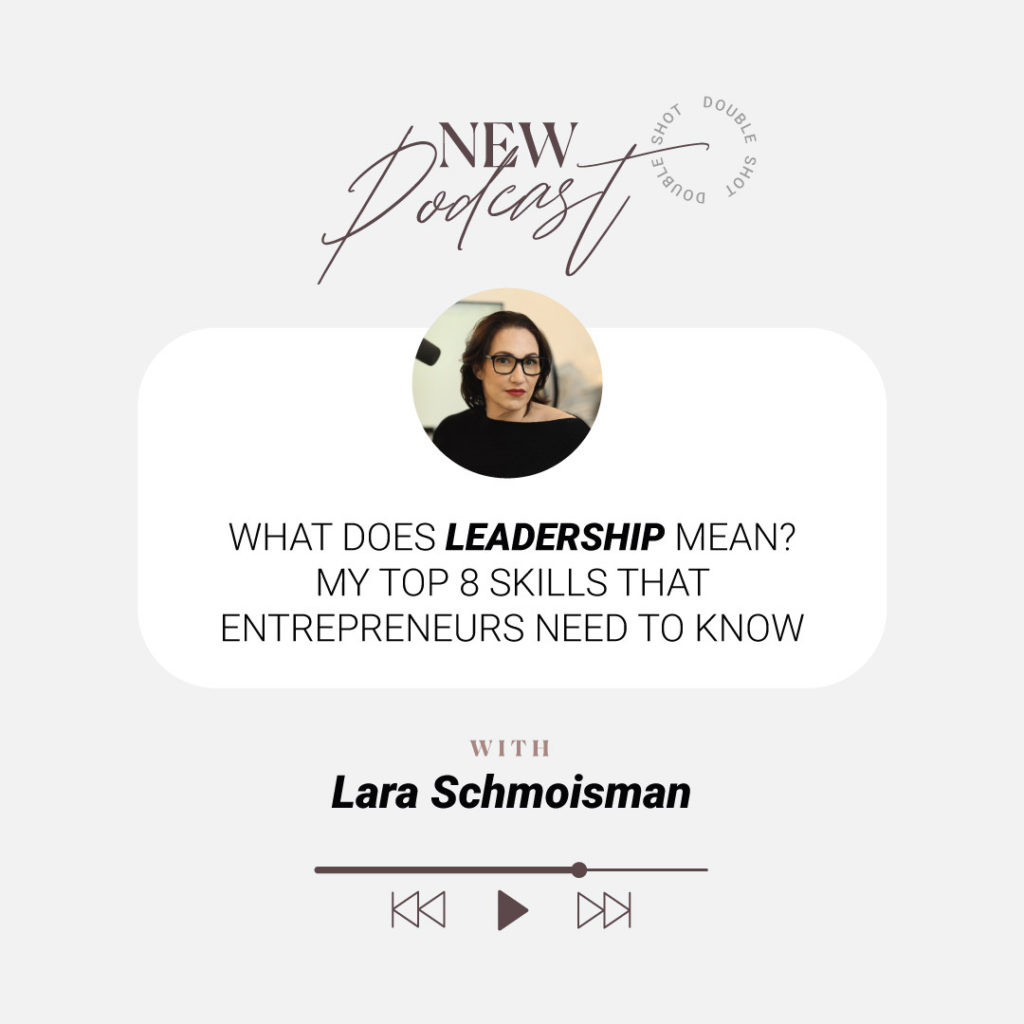Lara Schmoisman:
Being part of the agency and creating this agency, I always say that I created this agency by design. It I learned a lot of things. And I learned a lot of things from working in different places, different Corporation options, smaller companies, bigger companies, and I felt like there was always a waste in the communications, I feel like I said the word those email threads that are oh my god, every time you want to find something, you need to go and dig and they dig, and you will never find it. And using key words, it was just too much. Also, at some point, I always was cutting edge. And when I was using Basecamp, for example, when he came out just to communicate with clients. As adults, we always make educated decisions and why we use something. And we do a lot of research in why we using different tools. So I learned that as an entrepreneur, as a business owner, I need to create some logistics. And one of the most important things about this logistics is that the whole team needs to be using the same systems. So something that I always tell is that we have something that we call the thing guide. And the thing that is given to everyone that is joining our team. And even we have a team guide for clients, and that they need to sign as part of their contract of how we’re going to communicate and how we do things. Remember that if you have questions, as I’m going to talk about my top eight leadership skills that every entrepreneur needs to know, please feel free to pop them in the question box. And if they are not live, see replays just pop the questions there as well. And I going to be going through the questions and trying to answer them, or maybe even your questions set up another Tuesday talk. That’s exciting. Anyway, so as I was mentioning before, a sip of my tea.
Um, as I was telling you before, I feel like logistics are really important. Everyone in the company needs to be working with the same logistics and the clients too. If you don’t have those logistics set in place, those logistics will fail. And they need to be very clear, every process needs to be very clear. Okay, so let’s talk a little bit about my eight tip tips and or eight skills, I realized that having to create the company culture. Let me backtrack a little bit more on as editorial work in corporations or work in smaller companies I work with independent as an independent contractor. But what I found out is that the company culture is different for every person. To me company culture, meaning I didn’t care about the bagels, i The MKR state if I stipulate that they will pay for my dinner, there weren’t things that that were relevant to me. And maybe because it was a different stage of my life that for me always having that kind of balance. than the freedom even if I wouldn’t go home to have a crazy night, poor brother to go home and read a book or watch a movie, but that was my time instead of working in a company. So for me, the perk of paying for dinner wasn’t a perk for me a perk was to the satisfaction of having a full workday done, and accomplish that I did what I had to do, and on top of that, leaving on time, so that’s for me, one of the perks that I would have rather have done like, than happy hours are that the happy hours were part of my work culture. So it doesn’t matter if you have one employee or one contractor, or whoever relationship you will have with them, you need to have the same company culture and the same rules for everyone. So for me engage your part your your team, they are individuals, each one is unique. And to me part of that culture is to get to know each person, and to get to see what they need and how you as a leader can help them grow in your team. And as a person, you as an owner, you are not only an owner, you are a leader, and you need to be setting by example. So for example, that are widows something like we celebrate birthdays, of course, everyone gets a gift for their birthday, then also, we have an open door policy. And this is something that I learned a long time ago, I was reading an article and I said it on my last newsletter, I think I remember the name of the article right now. And I’m trying to gonna try to find it, it was called “There is no the dickheads in the workplace”, or something like that. And it was like, wow, besides the shocking title, and everything, for me was really how many meetings you need to have as a closed source. I mean, with information is not power in for only is power, if you know what to do with information. When I was in production, I was always told that I need to have my agenda are all my contacts that those if I can get those contacts from anyone, I will be very powerful. I never realized that what should mean is not only what to do the contact is how to contact them. And if they don’t know you, even if you have the number they will not answer. So whatever. So as we said, we celebrate birthday, we have open door policy. And something else that we did, though, that I think is really fun, we have a monthly challenge. Every month someone in the team, actually the winner of the last challenge, need to begin your challenge. And you need to be something that everyone can do it all over the world and remote. So for example, the challenge this month is everyone each one of the persons need to choose send a picture that their favorite place in the world to live in. So what we’ll do with that,
with that place, we send the picture to the person who organized it and the end of the month, we need to evolve, it is a multiple choice. And we’ll see how much each person I mean, how much we know about our team members, which is very good. Okay, skill number two. So skill number one is to create a company culture. Skill. Number two, is to ask questions for me is important that you need to understand what makes people pay. What are we have something, for example, that it’s called blue sky. And I always get rather to give examples of what we do. Blue Sky is something that we do every month for each one of our clients, everyone who is involved in that account, I don’t care if it’s an executive, or if it’s an intern, everyone is in that meeting. And we’re going to be talking and using the data that we have and analyze how the client is doing and how we can do better how we succeed and what they’ve been worked so well. So how we can improve, but also everything based on data, then I don’t care who you are I going to be asking questions. And I value those opinions because those opinions mean that that person is working in the account. So they have a perspective. I see an overall because I’m involved in different aspects, but also I have experience I have previous experiences and I have my own point of view. So it’s always valid to see because maybe I’m not the target audience As for my client, but my intern is so you never know when that good opinion can come from. And that’s again, it’s about the open door policy is always valued opinions, and I will make an executive decision that I need to, it’s great to hear what other people say. And they have to say, and their opinion, okay? Third, share feedback. Every morning, we have some call. Every morning, I meet with my project managers, but on Monday, we meet with the whole team. And it’s important to share the feedback share what we know what we hear from the client, from what we hear, even in social listening, we it is make sure that nobody is missed in that call. So it’s really important for absolutely everyone to be in that morning call. There are some people that I don’t talk to them almost ever, or I see them in, in meetings, or randomly, I get to talk to them. But in that Monday meeting, we know what to expect in that week. So it’s important to know, where’s the agency hitting, if we have an emergency, it’s important for people to know and that’s how they’re going to be part of the team and they’re going to feel part of the team. For me, you know, many times I say I’m, if you want the inspiration, motivation, don’t come to me. And that’s totally how I feel. But you need to be an inspiration and a motivation for your team, you need to lead by example, or you need to generate your passion, like I truly love what I do. And I do use like when there are issues, I use one on one meetings, and we use other other ways to align and to get to know that person, but also how can you motivate them how to Inspire, Inspire them to be better to work better to be to want to be part of your team? Then, okay, we’re gonna go to tip number five. Okay, um, tip number five is cultivate your image. Depending on your industry,
you can press one way or another, it doesn’t matter, it’s who you are, and your target audience. , But you also need to make sure that always to consider it, some basic PR approach, whatever you do, you need to look professional, I cannot just I’m not gonna work wearing pajama. I mean, it has to take a lot for me to not be in a meeting or not be with my teamI need to be super sick. And even if I’m super sick, I gonna try to be there. But still, your image is important, one of the rules that we have in the data and also that the team will know it before they start working with us that one of the rules is always so having a camera on that one on one looking at the person in the eye on the eyes. And talk to them means a lot, you can see how people react to what you’re saying. And you get that nonverbal feedback. But always look professional. Um, tip number six, develop financial literacy. I’m not asking you to be all that you’re telling you that you have to be a financial Master, I have my accountant that I don’t know what I would do without her. I, I do have my bookkeeper that I’m completely useless with when it comes to books. But I do know when I need to do my taxes, and I know know how to read their bookkeeping and make sure that everything is aligned and everything is correct. You need to understand where you’re standing. As I mentioned it many, many times, we are really risk assessors as a as an entrepreneur or business owner, we need to know where our finances are. So what we can do and what we cannot do. So be smart and know where your money is. Master technology. As I told you, I’m a geek and everyone who knows me knows that I love technology. And I always want to see how we can be more efficient, how we can be better, how can we communicate better. So there are some technology that for us works and I’m happy to I mean in my website, you can go and you can get all this technology. And you can see, then you can see why we use it because it’s amazing technology. And I think it’s the most cutting edge technology today and combining it, we become very efficient. We use this airtable, Slack, scared for social, and zoom. And of course we use Google Drive is so convenient to everyone being on the same page. And if we’re working on a document, everyone can see the document and where we make changes. And my last tip, and leadership skills that I want to give you is just get back, being socially responsible. And you can always strengthen your business and make your stakeholders happier. But you need to support causes that contribute to your community. And also, as I mentioned before, lead by example, that I like I always say in business, there is no religion, there is no gender, there is no race. Well, the same in my team, we are just a teen, and I embrace and I applaud each culture and I love to have each one of them. And and I feel like we can learn so much because we live in a global world right now. So I hope that these eight tips helped you somehow. And I’m happy to be here for any questions that you always can reach out. So thank you for being here today. And I will see you next week. Chau chau!








